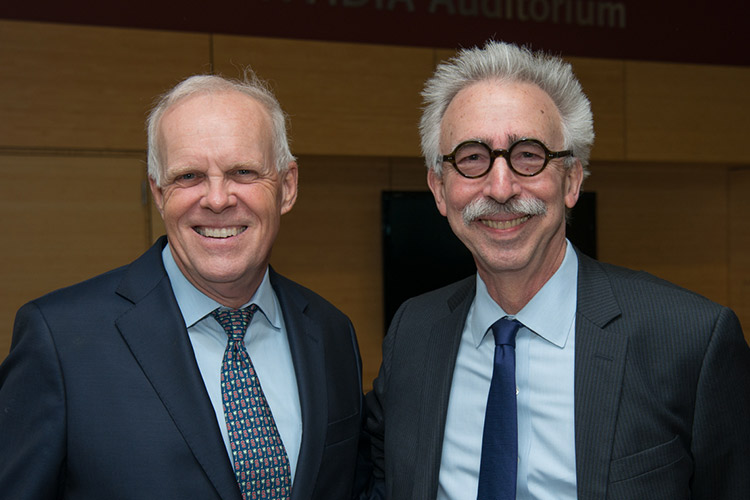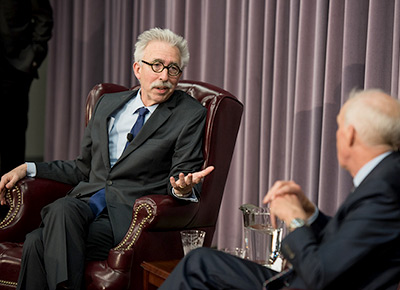Berkeley chancellor, Stanford president kick off online-learning summit
Chancellor Nicholas Dirks discussed the promises and limitations of online learning with Stanford President John Hennessy, in a conversation at Stanford Friday. The event was the opener for a higher-ed summit on "inventing the future of higher education."

April 18, 2016

Stanford President John Hennessy and UC Berkeley Chancellor Nicholas Dirks (Photo by Steve Castillo)
Online courses may not have overwhelmed undergraduate education in a disruptive “tsunami,” as once predicted. But teaching and learning technology is “going to change the landscape of everything we do,” UC Berkeley Chancellor Nicholas Dirks told an audience at Stanford University on Friday.
Dirks made that prediction in conversation with Stanford president John Hennessy, kicking off the fourth annual “learning summit,” held this year on the Stanford campus.
“We’ve seen that online resources can be very important,” Dirks said. “But at the same time they don’t substitute for being there” – for personal contact with faculty or the sense of community that residential undergraduate institutions provide.
So far, he added, MOOCs have been “most spectacularly successful for students who have graduated.”
Hennessy concurred, observing that massive open online courses (MOOCs) have gotten their greatest traction among professionals already working in their field.
A computer scientist by training, Hennessy referred to the present as a time of “great experimentation” concerning online learning and technology in the classroom, and called for new research to help measure effectiveness and establish best practices.
About 150 leaders from higher education, industry and government attended this year’s invitation-only learning summit, sponsored by Berkeley, Harvard, MIT and Stanford and titled “inventing the future of higher education.” Lifelong learning, digital humanities, challenges and opportunities posed by online learning, the future of academic credentials and responsible use of student data were among the topics on the summit’s agenda.

Chancellor Dirks chats with President Hennessy (Photo by Steve Castillo)
During the opening dialogue, held in Stanford’s Jen-Hsun Huang Engineering Center, Hennessy referred to “several things that are a little worrisome” about online education. He cited, for one, a recent edX study on student attention spans, which it pegged at 6.5 minutes. Many students believe “they are the world’s best multi-taskers,” he said, but “in fact they aren’t very good at it.” If online education is to succeed, “you have to make sure you get students to really pay attention to the material.”
Hennessy also cited research indicating that particularly for students from disadvantaged backgrounds, mentoring, coaching and faculty interaction are key to success in competitive university settings. That’s a cautionary tale, he said, as campuses seeking to attract and retain such students also contemplate putting more pedagogical materials online.
The kind of claims that were made about MOOCs as democratizing will never finally compete with the democratization that is made real by institutions like the University of California.
– Nicholas Dirks
Dirks agreed that personal attention is required to help such students succeed. However much we may envision robots, artificial intelligence or virtual reality as boons to education, he said, “we know that for a very long time we will still require the presence of real people in real time.”
The two leaders discussed a number of ways that technology can be a pedagogical asset. It could be used to help educators gather data on how students learn, they suggested, to flag gaps in student understanding and intervene appropriately, and to help students improve their writing. In a more futuristic vein, high-quality virtual-reality experiences (though “incredibly expensive” to build, Hennessy cautioned), might be used to foster empathy in students or immerse them in cultural differences.
On the nearer horizon, Dirks spoke of inserting online modules into the curriculum, as supplemental material, “without disrupting the fundamental principle of residential education.”